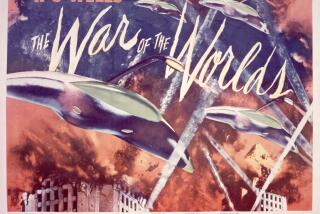Is this really World War IV?
Last month, observers reacted with alarm to President Bush’s declaration that if Iran gained the knowledge necessary to build a nuclear bomb, it would risk World War III. Perhaps they should have looked on the bright side. Compared with prominent conservative commentators, Bush revealed himself to be something of a dove. By warning about World War III, after all, he implied that we are not already fighting World War IV.
On the right, “World War IV” has become one of the most popular ways to describe America’s conflict with the practitioners of violent jihad. It started with Eliot Cohen of the Johns Hopkins School of Advanced and International Studies, who insisted just two months after 9/11 that we should call our new war by this “less palatable but more accurate name.” After that, the term was picked up by Norman Podhoretz, the longtime editor of Commentary who is now an advisor to Rudolph W. Giuliani -- and who has made it the title of a recent book. Along the way it has entered the vocabulary of such conservative commentators as William Bennett, Michael Ledeen, R. James Woolsey and Larry Kudlow. Don’t be surprised if a Republican presidential candidate uses it one of these days.
The shift from the “war on terror” to “World War IV” may seem semantic, but in subtle ways it fundamentally recasts not only the conflict we’re in today but the one we fought for almost 50 years against the Soviet Union. To believe the United States is fighting World War IV, after all, you have to believe that during the second half of the last century, we fought World War III.
But did we? The truth is that the United States didn’t fight World War III; we fought a “Cold War,” which was the exact opposite. The whole reason Walter Lippmann invented the term in 1947 was to describe a state of geopolitical hostility that didn’t include military conflict: That’s what made it cold. The clear contrast was with World War II, in which America lost hundreds of thousands of troops in battlefield confrontations with Nazi Germany and Japan. Lippmann’s term stuck because America’s standoff with the Soviet Union never devolved into that kind of global war.
To be sure, each side aided local proxies, sometimes even sending in its own troops (as the U.S. and China did in Korea, and the Soviets did in Afghanistan). But unlike during World War I and World War II, Europe’s industrial heartland remained at peace, regional wars never became globalized and American and Soviet troops never fought one another in any significant way.
That wasn’t an accident. It happened in large part because American presidents generally chose to contain Soviet power rather than attempt to roll it back, which would have dramatically increased the chances of military conflict. And it happened because American presidents, from Harry Truman in Korea to John F. Kennedy in Cuba, did not respond to communist advances with a nuclear first strike.
Those decisions were highly controversial. Prominent conservative intellectuals repeatedly demanded that America ditch containment in favor of rollback and urged U.S. leaders to consider preventive war -- especially in the late 1940s, when the U.S. had a nuclear weapon and Moscow did not. The most important of those intellectuals was the National Review’s James Burnham, who wrote a long-running column titled “The Third World War.” He chose that title for a reason: He believed America’s struggle against communism was the great conflict of his time, and he didn’t want it to stay cold. He believed that unless America fought directly and aggressively against its Soviet (and later Chinese) enemies, communism would take over the globe.
Whether they recognize it or not, the conservatives who today invoke World War IV are Burnham’s successors. They are altering the past to make it appear that we took his advice and defeated the Soviet Union on the battlefield. But that’s exactly what America did not do. We defeated Moscow because of the strength of our economic and political system, and because of our success in rehabilitating Western Europe and Japan so they served as both natural buffers to communism’s spread and powerful magnets to people living under the Soviet boot. We won because we contained and deterred the Soviet Union rather than confronting it. America fought the Cold War, not World War III, and thank goodness we did.
Bush’s preferred phrase -- the war on terror -- has many problems. But because it follows such campaigns as the war on poverty and the war on drugs, which are partly or largely nonmilitary, it functions somewhat like the phrase Cold War. It implies a “war” that doesn’t necessarily involve force of arms. World War IV, by contrast, eliminates all paradox and implies full-on battlefield conflict. It’s no coincidence, therefore, that the person most prominently associated with the term, Podhoretz, is also one of the most vocal advocates of bombing Iran. The more he succeeds in distorting American history, the closer he’ll be to getting his wish.
Peter Beinart is a senior fellow at the Council on Foreign Relations.
More to Read
A cure for the common opinion
Get thought-provoking perspectives with our weekly newsletter.
You may occasionally receive promotional content from the Los Angeles Times.










